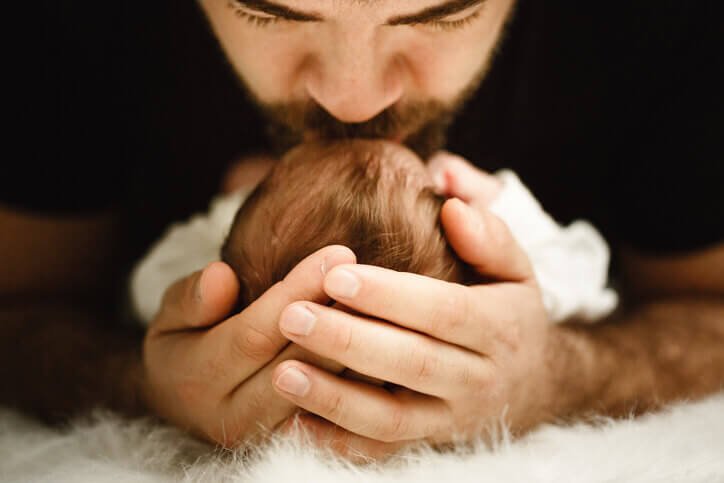
With Cold Sore Virus Blamed for Baby’s Death, Should You Take Preventative Measures?
[cs_content][cs_section bg_color=”hsl(0, 0%, 100%)” parallax=”false” separator_top_type=”none” separator_top_height=”50px” separator_top_angle_point=”50″ separator_bottom_type=”none” separator_bottom_height=”50px” separator_bottom_angle_point=”50″ style=”margin: 0px;padding: 45px 0px;”][cs_row inner_container=”true” marginless_columns=”false” style=”margin: 0px auto;padding: 0px;”][cs_column fade=”false” fade_animation=”in” fade_animation_offset=”45px” fade_duration=”750″ type=”2/3″ style=”padding: 0px;”][x_custom_headline level=”h1″ looks_like=”h1″ accent=”false”]With Cold Sore Virus Blamed for Baby’s Death, Should You Take Preventative Measures?[/x_custom_headline][cs_text]Written by Dr. Larry
[dropcap]W[/dropcap]ith the death of a newborn girl from HSV-1 viral encephalitis, you may be wondering if you should keep anyone from kissing or even touching your baby, highlighted by the sensational CNN headline “Baby dies of viral meningitis after deadly kiss.”
I commented on this story for KTVU, San Francisco’s Fox station as their medical expert. My opinion is that you shouldn’t freak out about kissing and touching babies, but you should freak out about fevers in kids less than a month old, and I’ll explain why below.
[/cs_text][x_video_player type=”16:9″ src=”https://youtu.be/G-o9odd7V34″ hide_controls=”false” autoplay=”false” no_container=”false” preload=”none” advanced_controls=”false” muted=”false” loop=”false” poster=””][cs_text]The short answer is — while a sad, tragic loss, this disease is very rare, and probably shouldn’t stop you from kissing or touching your newborn.
I work as an ER doctor, and a baby under 30 days old with a fever is a true medical emergency. A baby’s immune system is relatively weak shortly after birth, which makes them susceptible to life-threatening infections (like HSV-1 that this Iowa infant died of) that the rest of us with fully functioning immune systems can fight off. I see kids all day long with fevers, and most of the time, a child with a rectal temp greater than 100.4 F has a virus that will go away on its own — like your toddler who picked up something from daycare — you just need to keep them hydrated and use Tylenol/Ibuprofen to keep the temp down. Sometimes, of course, kids can have fevers with ear pain (ear infection), sore throat (Strep throat) or urine infections. These bacterial infections (not viral) often, but not always, need antibiotics to get better. But they are not medical emergencies like the 10-day-old with a temp of 102, which again, can be life threatening.
The real take home point of this story is not to stop kissing babies, but rather, if your newborn is sick — fever, lethargic, not acting normally — call your doctor because it could be serious, and consider going to the ER. That’s the main thing I want you to learn from this story; I don’t want you to freak out about baby kissing. Explaining a little about HSV might help explain why.
Let’s talk about the specific disease that killed this child: HSV-1 meningitis and encephalitis. HSV-1 is Herpes Simplex Virus, a herpes virus. Yes, this is a virus that causes mainly cold sores, but also genital herpes, and it is spread by contact with an infected (usually symptomatic but not always) person. So while it is true that the child that died did get this infection from physical contact with another person, and it could have been a kiss, it also could have been on someone’s hand. Now, I’m assuming this was not passed during birth from a genital herpes ulcer, which is also possible, but HSV-1 is not going to be transmitted intrauterine when the baby is still inside the mom. At any rate, I doubt anyone knows how this child was infected with HSV-1, as sensational of a headline as “Baby dies of viral meningitis after deadly kiss” is. The virus gets in the blood stream, and then in the case of meningitis (meninges = thin layer of cells that cover the brain, itis = inflammation; meningitis is inflammation of the cells on top of the brain) causes serious, potentially life-threatening infection. But this infection didn’t stop at the cells on the surface of the brain, the meninges. In this case, the infection was deeper, of the actual cells of the brain. We call that encephalitis, and that is scarier because it can often lead to permanent brain damage, or in this case, death.
Now HSV-1 viral encephalitis is rare, with an incidence of about 1/500,000, which is about half the chance of being struck by lightening (1/960,000). Because it is so rare, I’m not sure it makes sense to worry about changing anything you do to prevent it. Are you going to modify your life behavior to avoid getting struck by lightening? No. Well, I hope not. If you are, we probably need to talk. Stop carrying lightning rods in thunderstorms? Check. I guess the baby equivalent to that would taking your newborn on a tour of day cares when they are 12 days old, or having hundreds of people kiss them in the hospital? Too much.
I’ve got a 7-year-old daughter. Of course I was paranoid that every little thing we did was going to ruin her for life. Turns out, she lived and is fine. If I have more kids, I would probably take the first month easy at home, both because of being tired from the sleep schedule, and maybe a little caution with an immature immune system. But I wouldn’t stop close family and friends from visiting; a hand-washing rule when the kiddo is under 3 months isn’t nuts.
There are treatments for such HSV-1 infections, with antiviral medication, fluids, steroids, etc. I’m sure this child received the best treatment available at a children’s hospital. Sadly, it wasn’t enough. I can’t imagine the loss of the parents.
So, what can we do to prevent this? No more baby kissing is a bit much, I think. Wash your hands. Breastfeeding offers some immune protection for newborns. And call your doctor early with newborn symptoms out of the ordinary, especially fevers. After that, this HSV-1 encephalitis is so rare that it doesn’t make sense to devote more preventative efforts in that direction.
For more info, I like this article on WebMD a lot.
http://www.medscape.com/viewarticle/883190
Here’s the CNN story
http://www.cnn.com/2017/07/18/health/baby-dies-of-meningitis-from-herpes-virus/index.html
Some stats about HSV Encephalitis
1-2,000 cases of HSV encephalitis in kids annually (10-20,000 viral encephalitis) in US.
Incidence of 2.2 in 1,000,000 or 1 in 500,000
Most infected (2/3) may have resulting neurologic deficits
20% mortality[/cs_text][x_gap size=”50px”][/cs_column][cs_column fade=”false” fade_animation=”in” fade_animation_offset=”45px” fade_duration=”750″ type=”1/3″ style=”padding: 0px;”][x_widget_area sidebar=”sidebar-main” ][x_widget_area sidebar=”ups-sidebar-adoption-services” class=”man”][/cs_column][/cs_row][cs_row inner_container=”true” marginless_columns=”false” style=”margin: 0px auto;padding: 0px 0px 30px;border-style: solid;border-width: 1px;”][cs_column fade=”false” fade_animation=”in” fade_animation_offset=”45px” fade_duration=”750″ type=”1/1″ style=”padding: 0px;”][cs_text]
Featured Content
[/cs_text][/cs_column][/cs_row][/cs_section][cs_section parallax=”false” separator_top_type=”none” separator_top_height=”50px” separator_top_angle_point=”50″ separator_bottom_type=”none” separator_bottom_height=”50px” separator_bottom_angle_point=”50″ style=”margin: 0px;padding: 20px 0px 0px;”][cs_row inner_container=”true” marginless_columns=”false” style=”margin: 0px auto;padding: 0px;”][cs_column fade=”false” fade_animation=”in” fade_animation_offset=”45px” fade_duration=”750″ type=”1/1″ style=”padding: 0px;”][ess_grid alias=”featured_content”][/cs_column][/cs_row][/cs_section][/cs_content]

